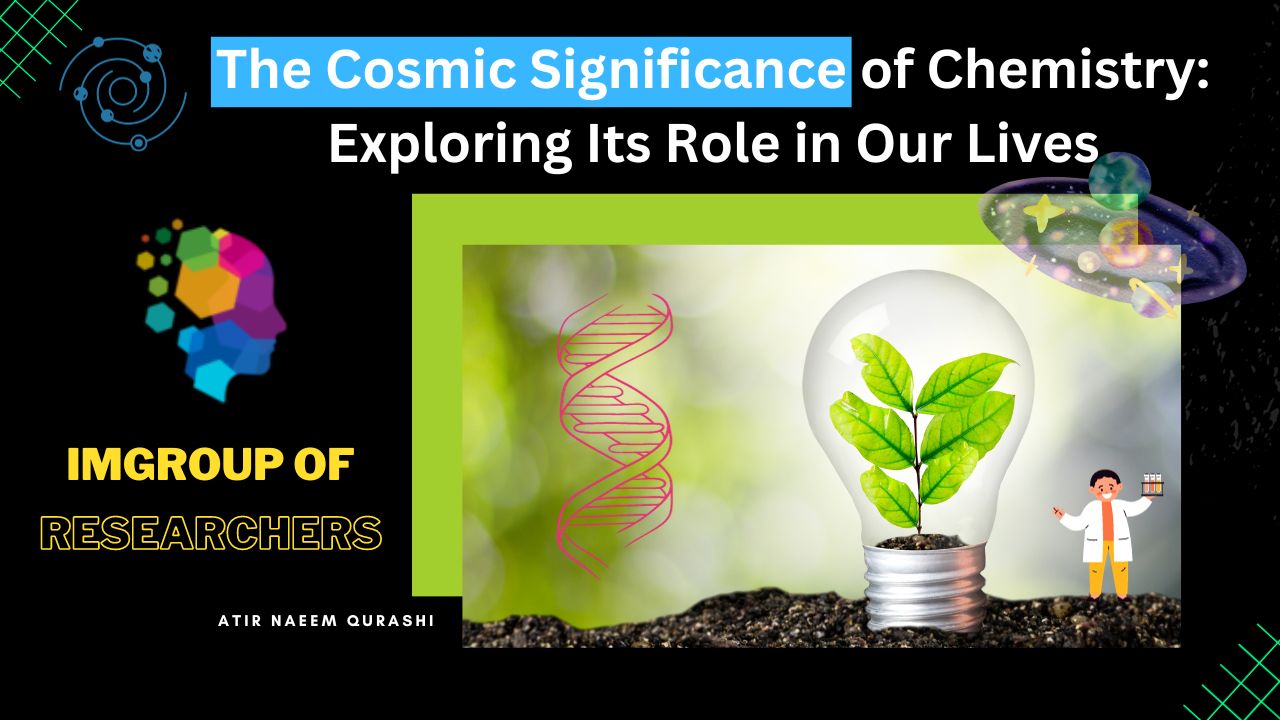The Cosmic Significance of Chemistry: Exploring Its Role in Our Lives
Chemistry, often referred to as the “central science,” is not just a subject we study in classrooms or labs; it’s an integral part of the cosmos, intricately woven into the fabric of our existence. From the formation of stars and planets to the molecular interactions that sustain life on Earth, chemistry plays a profound and awe-inspiring role in the universe. In this blog, we embark on a journey to “The Cosmic Significance of Chemistry: Exploring Its Role in Our Lives”.
Author:
Atir Naeem Qurashi

LinkedIn: Click here to see Atir’s profile
Physicists may say that the universe operates under the laws of physics. While mathematicians argue that the universe adheres to mathematical rules. But there’s one undeniable truth: the universe is fundamentally composed of matter; without matter, there is simply nothing.
So here comes the king, the central science called chemistry. We study the matter and its properties with the knowledge of chemistry and then come the laws and rules afterward. Now, it’s essential to clarify that this isn’t a competition among scientific disciplines. Instead, it’s about highlighting the paramount significance of chemistry and why it rightfully earns the title of the central science.
Let’s begin by understanding that chemistry isn’t confined to Earth. It’s a fundamental force that shapes the universe. Elements, molecules, and compounds exist not just here, but throughout the cosmos.
You see, galaxies, black holes, dark matter, plasma, and more—they all represent distinct forms of matter, and we can decode the secrets of the universe through the language of chemistry. Most importantly, life on Earth, with its diverse biological forms, including plants, animals, and microorganisms, is composed of matter. DNA, the molecule of life, is a beautiful example of cosmic chemistry at work. the structure of DNA is based on the chemistry of the elements that make up our DNA code.
But our journey doesn’t stop here. There is a role of chemistry in the search for life beyond our planet, including the chemistry of potential extraterrestrial environments and the hunt for exoplanets. chemistry plays a significant role in everything we do.
You can thank chemistry every day!
The Chemistry of the Cosmos
Stellar Alchemy
The elements that make up our world, from the oxygen we breathe to the carbon in our bodies, were forged in the hearts of stars. Through a process called nucleosynthesis, stars transmute light elements like hydrogen and helium into heavier elements. When massive stars explode in spectacular supernovae, they scatter these newly created elements into space, seeding the cosmos with the chemical building blocks of life.
Planetary Formation
Chemical reactions and interactions are the driving force behind the formation of planets. Dust and gas in the vastness of space clump together, driven by gravitational and chemical forces. As these particles collide and merge, they form the solid cores of planets, where the elements they contain dictate the geology and chemistry of the entire world.
Molecules of Life
Chemistry is the language of life. The formation and function of complex biomolecules, such as DNA, proteins, and carbohydrates, are all governed by chemical principles. The way these molecules interact and react is the essence of life itself. Understanding these chemical processes is crucial for fields like biochemistry, pharmacology, and medicine.
Chemistry in Our Daily Lives
Medicine and Healthcare
In the realm of healthcare, chemistry saves lives. From the development of antibiotics to the synthesis of life-saving drugs, chemistry is at the forefront of modern medicine. Diagnostic tests, imaging techniques, and treatments are all rooted in the principles of chemistry.
Energy Production
The energy we use daily, whether from fossil fuels or renewable sources, is a product of chemical reactions. Understanding and optimizing these reactions is vital for sustainable energy production. Battery technology, fuel cells, and solar panels all rely on chemistry to harness and store energy.
Environmental Chemistry
As we grapple with climate change and environmental challenges, chemistry plays a pivotal role. Environmental chemistry helps us analyze pollutants, develop cleaner technologies, and mitigate the impact of human activities on the planet. It’s essential for a sustainable future.
Food and Agriculture
Chemistry is integral to food production, preservation, and flavor. It ensures the safety and quality of the food we consume. From understanding food additives to optimizing crop yield, chemistry contributes to food security and gastronomy.
Exploring Beyond Our Planet
Chemistry extends its reach beyond Earth. In the quest for understanding other celestial bodies, chemical analysis helps us identify organic compounds on Mars, study the composition of comets and asteroids, and analyze the atmospheres of exoplanets in the search for extraterrestrial life.
Conclusion
The cosmic significance of chemistry is profound and multi-faceted. From the birth of elements in the hearts of stars to the synthesis of life’s molecules and the betterment of our daily lives, chemistry is a driving force in the universe. By exploring its role, we gain a deeper appreciation of the cosmos and a better understanding of our place within it. So, the next time you marvel at the night sky, remember that the very elements that make up the universe are intimately connected to the chemical reactions that make up life as we know it.
Watch a video on this topic: Click here!
Also Read: An Overview on Photocatalysis
Follow Us on

